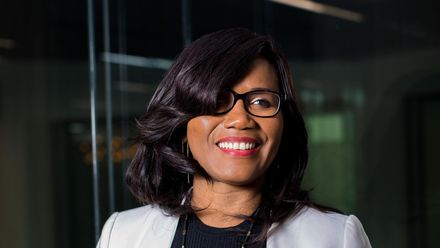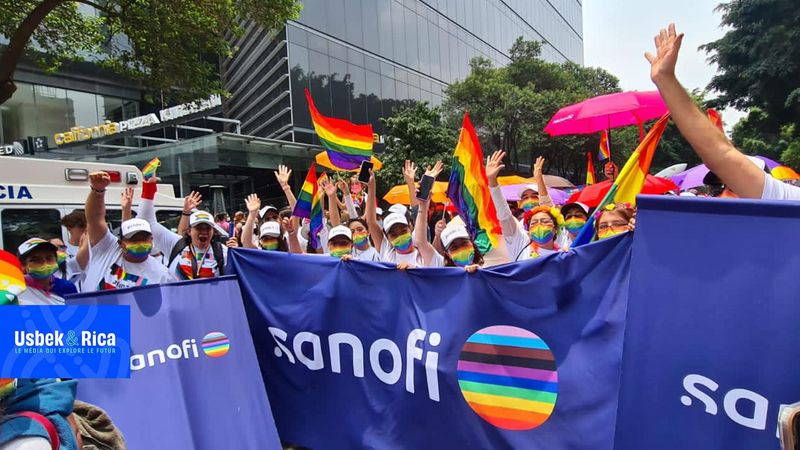Fighting for Inclusion: Can inclusion be measured?

"What cannot be measured will not progress".
Measuring diversity using quantitative indicators is key to advancing inclusion in the workplace. Why? Diversity drives economic and social performance. Former minister Elisabeth Moreno and entrepreneur Dominique Crochu, co-founder of Mixity, take us through the stages of this journey towards a more open and inclusive society. Sanofi has been on the journey for many years now, thanks to its strong diversity and inclusion policy. And as official partner of the Paris 2024 Olympic and Paralympic Games - which are expected to be the “most inclusive in history” - Sanofi’s journey towards inclusivity is moving full speed ahead!
To mark the occasion, Sanofi and Usbek & Rica joined forces to explore the future of inclusion.
When it comes to inclusion, French companies still have a long way to go. According to a Heidrick and Struggles report, only 61% of companies integrate diversity, equality, and inclusion into their strategy, compared with 85% of companies worldwide. Yet this gap can be filled. How? Companies are becoming more conscious about the importance of these issues, because they realize that they are key to staying competitive while helping fill employees’ desire for finding purpose and meaning.
The challenge? In France collecting data on ethnicity, social background or sexual orientation is illegal. according to Elisabeth Moreno, however, "what cannot be measured will not progress". The former Minister for Gender Equality, Diversity, and Equal Opportunities is now the company founder and director of La Puissance du Lien. And just recently, she joined Sanofi's Diversity, Equity, and Inclusion Board.
When it comes to inclusivity, you first need to know how and what to measure. From a legal standpoint, France has some of the strongest legislation in Europe. The Rixain law, issued in December 2021, encourages companies to improve gender equality, including gender quotas ensuring women have at least 40 percent of seats on management committees by 2029. Companies are also now required to hire and declare workers with disabilities. Internally, though, progress is still slow.
I've talked to a lot of company directors who are convinced that their inclusion and diversity policy is the real deal. But they get embarrassed when asked how many women and individuals from working-class backgrounds hold management positions

Elisabeth Moreno
Former French Minister for Gender Equality, Diversity and Equal opportunities
Just another reason why providing measurement tools is essential.
"Can you measure inclusion?”
According to Dominique Crochu, measuring inclusion is possible. “I'm always hearing about what's impossible and very little about what's possible. And yet, the possibilities are so much more interesting.“
Dominique Crochu was the first woman to hold a management position in the French Football Federation (FFF). For ten years, the entrepreneur oversaw the digital sector, another area in dire need of diversity. In 2019 together with Sandrine Charpentier (CEO) and Jérôme Fortineau, she founded Mixity, a digital HR solution startup that offers tools for measuring - and encouraging - diversity and inclusion.
"When we first started out, we realized that there were no measuring tools. In the world of sports, you can’t improve if you’re not using proper measurements.. You don’t progress beyond empty rhetoric". The startup helps companies assess their current situation, providing "a snapshot" of social, diversity, and inclusion through an audit based on gender, disability, multicultural, multi-generational and LGBTQ+ factors. Employees also participate in a survey about the company's diversity and inclusion policy. "It's a bit like a support center. Based on these two measurements, and with the help of Mixity, companies can draw up a roadmap ".
In recent years, measurement tools have grown thanks to Elisabeth Moreno during her time as Associate Minister on Gender Equality, Diversity, and Equal Opportunities. In November 2021, she launched a Diversity and Inclusion Index. Companies [in France] can’t officially “count” where employees come from. But individuals can investigate these measurements themselves, thanks to a survey we created. The survey had employees, on a voluntary basis, share answers to simple questions like where they were born, where they live, and where their parents are originally from. And in just three months, we had nine companies participate and received over 38,000 responses.
This is proof that you can measure data involving inclusion by involving public players, companies, and associations. "It's a virtuous triangle". National employment agency “Pôle Emploi”, one of the public companies involved, used the index to improve their HR policy.
Does great resignation mean great inclusion?
"I'm convinced that inclusion is a source of economic and social performance," adds Elisabeth Moreno. "We know that the majority of tomorrow's jobs will have a scientific or technological component. Yet only 30% of women go after these sectors. We are looking at shocking inequalities, not to mention major competitiveness issues".
"In life, it takes all kinds to make a world. Nothing is black or white. But what about in the advertising world?"
The media and advertising worlds are slowly realizing the importance of diverse cultural and gender representation. In October of 2022, the French advertising regulator ARPP launched an advertising campaign aimed at encouraging a more accurate representation of society at large. On French channel TF1, the successful series Ici tout commence has long featured a non-binary and pansexual character, following in the footsteps of otherseries like Plus belle la vie and Un si grand soleil. These tv show have tackled societal issues by introducing diversity not seen before on TV, an example for companies to follow.
A study by the Boston Consulting Group published at the end of 2021 revealed that companies with above-average diversity in their management teams are 19% more innovative than less inclusive companies. What’s more, their profitability is 9 points higher.
Since COVID-19, employees have become more vocal in their demands for a diversity and inclusion policy. We can clearly see that there’s been a shift in people’s relationship to work. They’re in search of greater meaning and transparency. Mixity, as a neutral and independent player, enables those changes by publishing companies' footprints," says Dominique Crochu. "In fact," Elisabeth Moreno adds, "the highly touted talent war is being won by the talents themselves. Today, it’s the talented professionals who choose which companies they want to work for. They look at what values are being promoted. If companies want to attract these talents that they need for growth, they need to step up their game when it comes to inclusion.
Include, or get left behind
Dominique Crochu points out that requirements apply to investors and clients alike, quoting activity reports from several major groups. They still include key measures of economic performance, but more recently, new indicators of social and environmental responsibility. "You can’t manage your organization today on the basis of financial indicators alone," adds Elisabeth Moreno. “It's not so much about measurements as it is about picking up speed and staying in the race.” According to Dominique Crochu, “Clients are now more demanding when it comes to corporate social responsibility. This adds to a growing awareness in the business world, as seen in new occupations focused on commitment and impact.”
In the United States, Chief Impact Officers are expanding on management committees and serve as ambassadors for their company's CSR policy to employees and the public. In France, the role of Director of Corporate Commitment has been growing over the years and is now part of standard corporate communication functions, in addition to the traditional HR positions that oversee matters related to inclusion. This goes to show that a company’s social and civic role is now all-present at every level of the organization. Change is on its way!
Discover more

January 25, 2024


